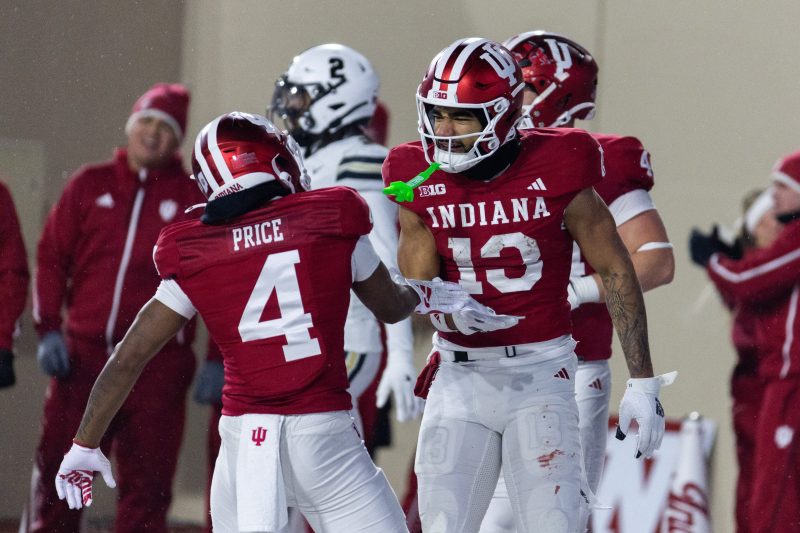Let me take you to a cold Connecticut suburb, and the vision of a man nestled in front of a roaring fire with a hot cup of joe.
Now imagine Burke Magnus, ESPN’s president of content, watching in horror as the cable giant’s hottest property was kneecapped by the College Football Playoff selection committee chairman. The biggest weekend of the college football season, followed a day later by the grand reveal of the new 12-team CFP, all minimized with one statement about championship week.
One wildly improper statement.
‘Those who are not playing (during championship week), we will not adjust those teams,’ said Warde Manuel, Michigan’s athletic director and the CFP selection committee chairman. ‘They don’t have another data point, obviously.’
No, not obviously. Not at all.
If Georgia beats Texas in the SEC championship game – far and away the best conference in college football – that isn’t another data point for Ole Miss? The same Ole Miss stranded on the bubble as the No.13 team in the poll?
The same Ole Miss that would then have an 18-point win over the champion of the best conference in college football? That’s not a data point?
The same Ole Miss that would then have a win over the No. 2 team, and a 24-point win at the No. 14 team (South Carolina). And three one-possession losses, two on prayer fourth-down throws from Kentucky and LSU.
As opposed to a resume of 11 wins vs. a schedule of every team with at least five losses.
This can’t be what we’ve come to with the new 12-team CFP.
Indiana coach Curt Cignetti’s CFP pitch: we’re good, really, we are!
Ole Miss coach Lane Kiffin’s CFP pitch: The team that won the SEC? We beat them by 18.
I don’t want to be the guy that has to keep saying this, but what in the world is Indiana doing in the CFP? Because if you take Manuel at his word – and I’m still not convinced he didn’t inadvertently misspeak under the pressure of live television (it’s easy to do) – there is no movement in the poll outside of the teams playing this weekend.
WINNERS AND LOSERS: Ohio State, Alabama get boost from CFP committee
BOWL PROJECTIONS: Alabama enters playoff field, while Texas, SMU move up
That means Indiana, which has no wins vs. the playoff committee’s top 25 and one loss of 23 points at Ohio State, is in the tournament. If we’re going to start awarding CFP bids to teams with one loss, why not hand one to Army?
The Black Knights are beating teams by an average of 17 points per game, and their only blemish is a blowout loss to No. 4 Notre Dame. This, of course, is ridiculous to the committee because Army plays in the American Athletic, and has an considerably easier path than Indiana.
Which is just like Indiana and its easier path than Ole Miss.
These are 12 precious spots, a ticket to the big show that should be earned, not allowed because of some random ideal that less losses is more important that big wins. What exactly are we promoting here by sending Indiana to the CFP?
That those who are fortunate to receive a randomly easier schedule than others, get a significant break on the road to the CFP? That’s utterly preposterous.
I don’t blame Indiana, I blame the selection committee. If those 13 members choosing the 12-team playoff can’t look at each other and admit the relative ease of schedule for Indiana is the factor in its school-record 11 wins, we’ve got much bigger problems with this system.
Indiana is a nice story, just like it was in 2020. That season, the Hoosiers were screwed out of a spot in the Big Ten championship game when the conference changed the return to play rules to get Ohio State into the marquee game.
Ohio State won the Big Ten, upset Clemson in the playoff semifinals, and lost to Alabama in the national championship game. Indiana lost to 5-5 Ole Miss in the Outback Bowl.
We’re not really doing this, are we? We’re not really rewarding a team for simply winning games against overmatched competition
Instead of rewarding a team that won games against elite competition.
This can’t be what we’ve come to with the 12-team CFP.
Matt Hayes is the senior national college football writer for USA TODAY Sports Network. Follow him on X at @MattHayesCFB.

